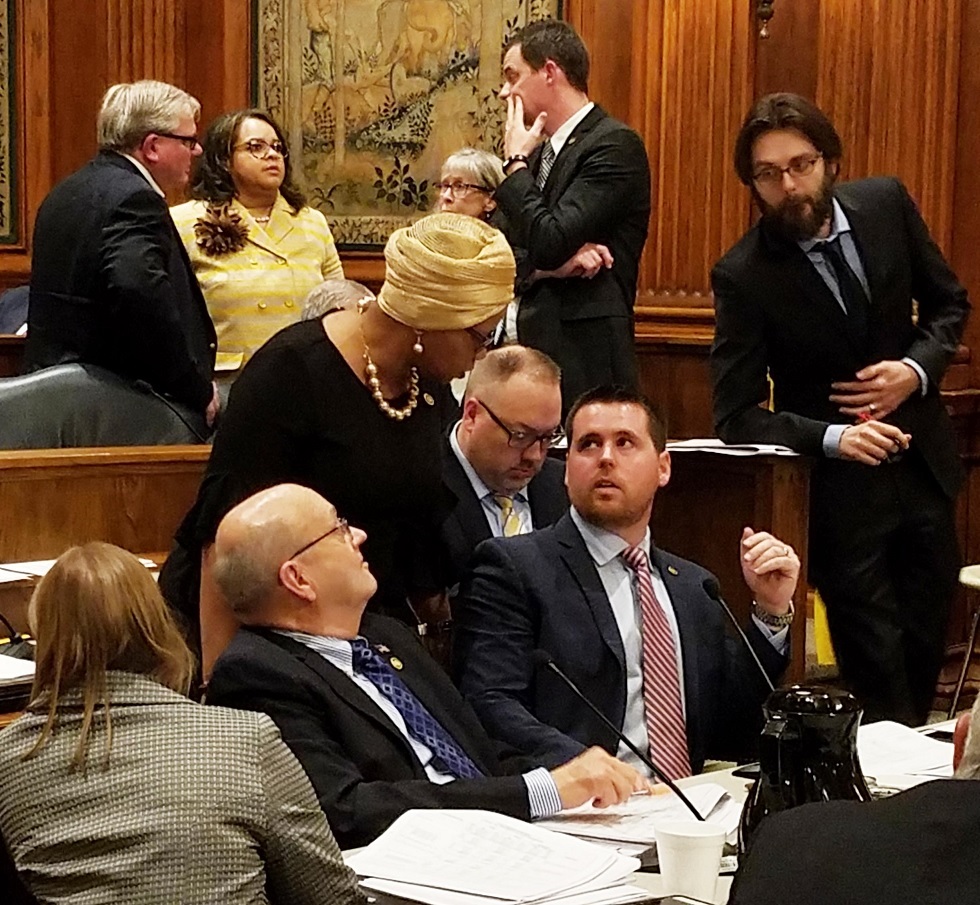House and Senate conferees have agreed to a budget that would make significant cuts in the Department of Health and Senior Services’ director’s office. House members say that department is needlessly withholding information about a virus outbreak that killed two people in Missouri, including one state employee.

The conference committee agreed to cut money equal to the salaries of eight positions in the director’s office, including the director.
House Budget Committee Vice Chairman Justin Alferman (R-Hermann) is one of several lawmakers who have asked how many people in Missouri have tested positive for the antibodies to the Bourbon virus. The House has also subpoenaed the Department seeking that information, and the Department still hasn’t provided it.
The Director of the Department of Health and Senior Services, who had not appeared before the House Budget Committee for any of its public hearings, did appear before the conference committee between House and Senate members that met Monday night to agree on a budget proposal for both chambers to vote on this week. Dr. Randall Williams maintains he can’t release what Alferman and others are asking for.
The Department’s General Counsel, Nikki Loethen, told the committee, “The issue here is that there is already significant information already available regarding who was tested and with all of that information that’s already available, for us to disclose the information that [lawmakers are asking for] could lead to the identification of individuals.”
Alferman said the Department’s argument that the information could lead to the identification of individuals is “ridiculous.”
Some senators on the conference committee wanted to restore what they called “drastic” cuts to DHSS, but Alferman and House Budget Committee Chairman Scott Fitzpatrick (R-Shell Knob) did not want to back down. Alferman had already agreed to reverse another of his amendments in response to the situation that shifted control of the state health lab from DHSS to the Department of Public Safety.
“I don’t know how I’m supposed to negotiate with someone who doesn’t come to the table,” said Alferman about the Department.
Fitzpatrick noted that Williams was once before at the center of a controversy with serious implications for public health.
In 2016 Williams, while the public health director for the State of North Carolina, joined another state official in rescinding a “do not drink” notice regarding well water potentially contaminated by coal ash. The state’s toxicologist at the time said North Carolina was telling people the water was safe when it knew it wasn’t, and went so far as to accuse other state officials of “playing down the risk.”
“It would just seem to indicate that there’s a pattern of behavior that Dr. Williams has made a controversial decision in the past,” said Fitzpatrick. “I just don’t think that allowing that to continue to happen in Missouri is a good idea.”
Democrats who opposed the cuts to DHSS noted the positions cut in the Director’s office would include the lawyers who interpret for the Department how it must act to comply with state and federal laws.
“I do find it concerning that when we ask the Department to interpret laws, both federal and state, and then they interpret it, if we disagree with their interpretation that we’re then going to cut their funding, of the very people who makes those interpretations,” said Springfield representative Crystal Quade (D). “We’re dealing with very sensitive information and very dangerous, life-threatening things, often, with these viruses, and it’s important that we are following the law accordingly so that we can make sure people are protected, so it was concerning to me that was the decision of the committee.”
Fitzpatrick noted that the cuts would remove 8 people from a department of more than 1,700 employees.
Backers of the cuts said they are concerned about the safety of the public, and that includes Missourians knowing whether they should be concerned about a bourbon virus outbreak.
The House and Senate are expected to vote Wednesday on the budget proposal for the fiscal year that begins July 1. The deadline for the legislature to submit a budget proposal to the governor is at the close of business on Friday.
Fitzpatrick said he would consider restoring the money for those positions if the Department gives the House the information it has asked for, but the next opportunity to do that would likely not come until work begins on a supplemental budget bill in January of 2019.
Earlier story: House Budget Committee adopts stiff cuts to DHSS over Bourbon virus data dispute